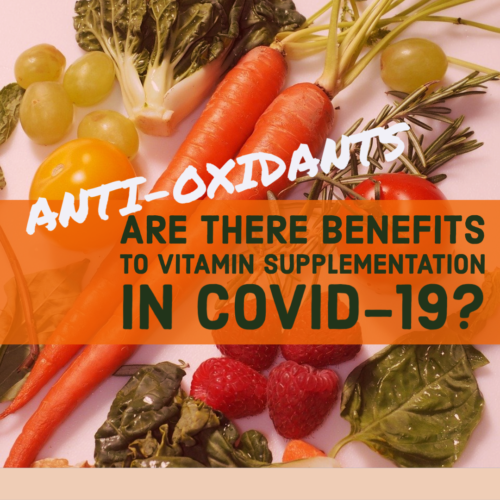Since treatment options to prevent and even treat COVID-19 are limited, the use of vitamins and mineral supplementation is worth exploring. Let’s look at what some of the research says about the benefits of vitamin supplementation in COVID-19.
Increasing the level of antioxidant nutrients within the body is thought to have a beneficial effect. And the dietary supplementation of nutrients has been recognized to alter the clinical course and health of patients. Vitamin A supplementation is helpful in many conditions. For example, vitamin A improves pulmonary function test results, has been found to have antimicrobial qualities, addresses vitamin A deficiency to effectively aid in tuberculosis prevention, and has antioxidative properties.
How does this relate to the benefits of vitamin A in COVID-19? The pulmonary, immunomodulatory, and antimicrobial roles of vitamin A may provide a crucial element in the fight against viral diseases, including COVID-19! Both oxidative

The Benefits of Vitamins During COVID-19
damage and the regenerative capacity of the lungs may be mediated through vitamin A-dependent mechanisms. Plus, vitamin A may combat viral infections. Because of its role in helping with pulmonary conditions and building the immune system, oral supplementation of vitamin A is a current topic of investigation in the treatment of COVID-19. 1
Other antioxidants are being studied concerning their role to combat COVID-19. The role these vitamins play in the body and how each boosts the immune system, their role in respiratory infections, acute respiratory distress syndrome (ARDS), and COVID-19…are all being examined. Vitamin C has an important antioxidant role, plus it may help in the stress response. Vitamin C has been encouraged as a treatment for respiratory infections since the 1930s. We are all familiar with its popularity in the prevention and alleviation of the common cold. And it may also have an antiviral effect.
Studies support the beneficial role of vitamin C in reducing bacterial and viral infections’ incidence and severity. Vitamin C is being investigated as a possible treatment to offset the effects of inflammation and oxidative stress seen in sepsis and ARDS. And there is evidence suggesting that vitamin C helps regulate the process that occurs in the damaging ‘cytokine storm’ in COVID-19. Its possible benefits, plus low cost and safety profile, make it an attractive candidate to help prevent and treat COVID-19. 1
The protective role of vitamin D in cardiovascular disease is well established, as it may significantly increase a person’s risk of stroke, heart disease, and even death. Plus, as most of us are aware, vitamin D intake plays a key role in bone health. Check out our other article, which discusses the many benefits of vitamin D called “Vitamin D: It’s Not Just For Bones Anymore.”
Vitamin D benefits the immune system. It plays a role in helping in chronic and acute inflammatory disorders, including autoimmune disease and infections. In fact, higher levels of vitamin D are associated with reduced risk for developing multiple sclerosis, gastrointestinal inflammatory disorders, type 1 diabetes, and other immune-mediated diseases. In addition, it has been suggested that vitamin D could reduce the effect on the exacerbation of the immune response and the complications in the ARDS condition in COVID-19. And therefore, it may play a promising role in COVID-19 treatments.1,2
Researchers are studying how vitamin D helps with the immune and inflammatory response in the body. Some studies show that vitamin D supplementation could lower the risk of acute respiratory infections. The British Dietetic Association recommends taking a daily supplement containing 10 µg to ensure a healthy vitamin D status (for adults and children over the age of one).3 And ‘The Irish Longitudinal Study on Ageing’ says that vitamin D could benefit vulnerable adults, particularly those over 70 years. (https://tilda.tcd.ie/publications/reports/pdf/Report_Covid19VitaminD.pdf)4
Even though appropriate vitamin D doses have been shown to provide benefits, especially considering that vitamin D deficiency leaves people vulnerable to other diseases, there has been some concern that higher doses may be harmful to those who also use ACE inhibitors.5 With that in mind, one study suggests a limiting consumption to a daily dose of 800-1000 IU of vitamin D to sufficiently meet the needs of most of the population.6
Further clinical trials are needed to assess the potential benefits of vitamin and mineral supplementation, including the anti-oxidants A, C & D, to prevent and treat the COVID-19 infection. In the meantime, follow your physician’s recommendations for the best vitamin and mineral supplementation to benefit you personally, eat healthy foods, stay active, and try your best to limit stress in your life to maintain your overall health.
1 Jovic, Thomas H., et al. “Could vitamins help in the fight against COVID-19?.” Nutrients 12.9 (2020): 2550.
2 Khare D, Godbole NM, Pawar SD, Mohan V, Pandey G, Gupta S, et al.Calcitriol [1, 25[OH]2 D3] pre-and post-treatment suppresses inflammatory response to influenza A (H1N1) infection in human lung A549 epithelial cells. Eur J Nutr 2013; 52:1405–15.
3 Verdoia, Monica, and Giuseppe De Luca. “Potential role of hypovitaminosis D and Vitamin D supplementation during COVID-19 pandemic.” QJM: An International Journal of Medicine (2020).
4https://tilda.tcd.ie/publications/reports/pdf/Report_Covid19VitaminD.pdf. Accessed January 23, 2021.
5Fang L, Karakiulakis G, Roth M. Are patients with hypertension and diabetes mellitus at increased risk for COVID-19 infection? Lancet Respir Med. 2020;8(4): e21.
6Mansour, Asieh, Mohammad Reza Mohajeri-Tehrani, and Sayed Mahmoud Sajjadi-Jazi. “Vitamin D supplementation in COVID-19: A friend or foe?.” EXCLI journal 19 (2020): 1166-1168.